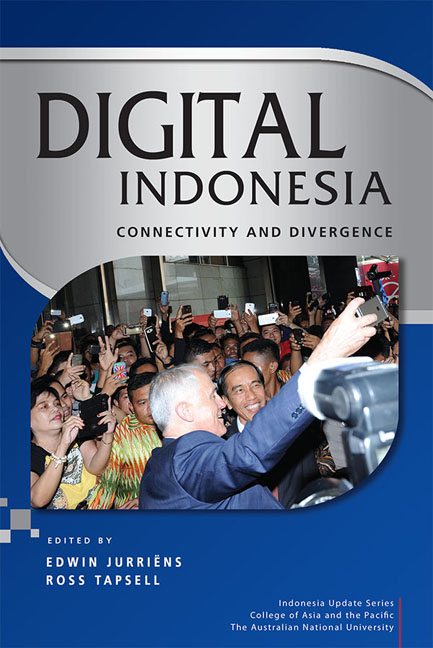Book contents
- Frontmatter
- Contents
- Tables
- Figures
- Contributors
- Acknowledgments
- Glossary
- Map of Indonesia
- 1 Challenges and opportunities of the digital ‘revolution’ in Indonesia
- PART 1 CONNECTIVITY
- PART 2 DIVERGENCE
- PART 3 IDENTITY
- 8 Digital activism in contemporary Indonesia: victims, volunteers and voices
- 9 Social media and Islamic practice: Indonesian ways of being digitally pious
- 10 Online extremism: the advent of encrypted private chat groups
- PART 4 KNOWLEDGE
- PART 5 COMMERCE
- Index
- Indonesia Update Series
10 - Online extremism: the advent of encrypted private chat groups
from PART 3 - IDENTITY
Published online by Cambridge University Press: 12 January 2018
- Frontmatter
- Contents
- Tables
- Figures
- Contributors
- Acknowledgments
- Glossary
- Map of Indonesia
- 1 Challenges and opportunities of the digital ‘revolution’ in Indonesia
- PART 1 CONNECTIVITY
- PART 2 DIVERGENCE
- PART 3 IDENTITY
- 8 Digital activism in contemporary Indonesia: victims, volunteers and voices
- 9 Social media and Islamic practice: Indonesian ways of being digitally pious
- 10 Online extremism: the advent of encrypted private chat groups
- PART 4 KNOWLEDGE
- PART 5 COMMERCE
- Index
- Indonesia Update Series
Summary
Although Indonesian extremist groups, like other political activists, have been using the internet to propagate their messages for years, the emergence of the so-called Islamic State in Iraq and Syria (ISIS) and its extensive use of social media have prompted fresh concerns about online terrorist recruitment and training. Social media platforms such as Facebook and Twitter have suspended the accounts of hundreds of thousands of extremists since 2014. For its part, the Indonesian government has banned dozens of jihadi websites. These crackdowns have con-tributed to an important trend in online extremism: the increasing use of encrypted mobile chat apps, in particular Telegram and WhatsApp. This chapter describes the shifting uses of digital technologies by extremist groups, and explains the importance of understanding how online social networks can be used to massage and mould extremist viewpoints.
Do the new digital technologies assist the causes of terrorists and their supporters? How do extremists interact in encrypted private chat groups? If repressive measures to restrict access to online platforms only lead to an exodus of extremists to encrypted chat applications, what other measures should be taken to address this trend? This chapter seeks to address these questions through a case study of pro-ISIS Telegram groups in Indonesia. I argue that the private chat groups function mainly as a space for social interaction and personal bonding, helping to broaden extremist networks, strengthen group cohesion and reinforce beliefs. In effect, the new social media, including private chat groups, are less about virtual training or plotting terrorist attacks, and more about sustaining and strengthening radical communities.
The Indonesian case study reveals that while social media has not replaced face-to-face contact as the main recruitment mode, it has allowed extremists to reach out to new audiences, including Indonesian migrant workers, and vice versa. The lone-wolf phenomenon (defined as an indi-vidual radicalised on his or her own without any interaction with other extremists, or through exposure to extremist materials and/or groups on the internet, without physical contact) remains very rare even in the age of social media. Indonesian extremists still rely heavily on study groups (pengajian) and other gatherings to maintain ideological conviction and group cohesiveness.
- Type
- Chapter
- Information
- Digital IndonesiaConnectivity and Divergence, pp. 163 - 186Publisher: ISEAS–Yusof Ishak InstitutePrint publication year: 2017

